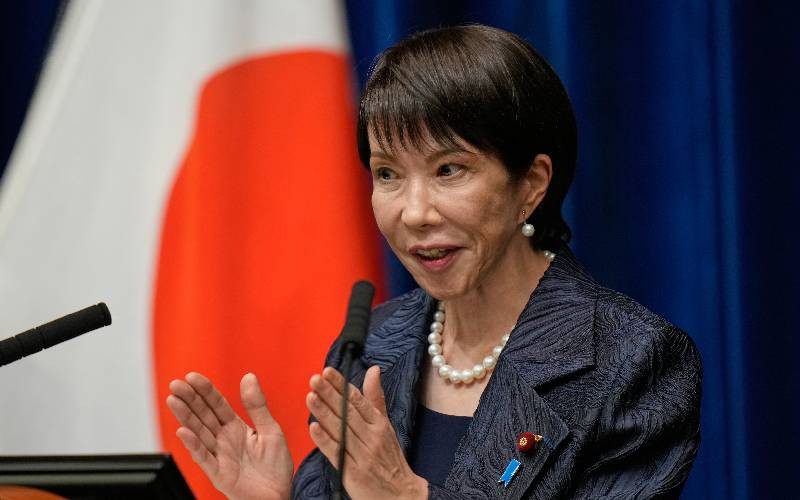
Japan's new Prime Minister Sanae Takaichi addresses a press conference in Tokyo on October 21, 2025. [AFP]
It’s unprecedented that Japan could get its first female Prime Minister, long after the UK, India, Indonesia, Bangladesh, Pakistan, Argentina, and New Zealand.
We can’t forget our southern neighbour, Tanzania, with a female president. Why did it take Japan so long? When will Kenya get its first female president? In my lifetime? Who will that be?
Sanae Takaichi was elected to head the Japanese ruling party, the Liberal Democratic Party (LDP). She must win a parliamentary majority by the end month to take the premiership.
The trick is forming a coalition with other parties. The withdrawal of the Komeito party, which has traditionally supported the LDP, complicates her path to the pinnacle of Japanese politics.
The “late” election of a female as premier in Japan can best be explained by the conservative nature of the Japanese society. And it did not start today.
Remember, the country went through a period of isolation (Sakoku) for two centuries before the United States forced the country to open up in 1853.
Remember Commodore Matthew Perry? That planted the seeds of modern Japan. The other root of conservatism is the leadership. Japan is an empire with a royal family. In traditional Japan, the emperor was like a god.
The existence of an emperor or royal family is the best exemplification of conservative values, just like in the UK.
I never get tired of asking why Britons did away with our kingdoms and kept theirs. I would be Prince Iraki or Duke of Somewhere.
Conservatives, particularly social conservatives, prefer traditional institutions and gradual change. Compare them with radicals and liberals. Conservatism often assigns” roles for each gender.
Reading through history, one is often struck by descriptions of women as homemakers, a better term than housewife. Certain roles are seen as unfit for some gender. Our own African societies were also conservative. Which community had female chiefs?
The conservative nature of Japanese society has kept them waiting for a female premier for a long time. Remember that under the current Imperial House law, only males can become emperors. Has that spilt over into the Premiership? Taking so long to get a female premier looks like a paradox.
Why should a country so advanced technologically be so conservative?
It’s not a paradox that conservatism is the anchor of Japanese success.
Stay informed. Subscribe to our newsletter
As Japan imported and adapted Western technology, the country remained Japanese. That created stability and more success. Let’s get closer to home.
Nairobi school
Have you noted how conservative Asians are in Kenya with their temples and Gurdwaras? And their sari?
My physics and maths teachers in high school in a Nairobi school were Indian ladies who wore the sari to class.
And I am not that old.
Noted Asian or is it Indian economic success not just in Kenya but across the globe, including the UK and the US?
Another good example to demonstrate the power of conservative values is the success of children whose parents were teachers, even if it’s just one parent. Talk to economically successful Kenyans, and it will surprise you how many had a teacher lurking in the backyard. Teachers epitomise conservative values that we silently admire.
That is why it’s hard to find unmarried lady teachers, even ugly ones.
Sadly, there is an emerging belief that conservative values are anti-modern, equivalent to being old-fashioned. Heard of the black tax? Helping or assisting others break the virtuous cycle of poverty is now seen as “stupid”?
Without conservative values, we have become a “hollow nation.” Does that explain why our institutions are not working and corruption is more in the headlines than charity?
We are yet to crystallise Kenyan values as we jettison our traditional values.
How many readers can list and interpret 10 proverbs from their community?
It’s an open question if Christianity has become the anchor for our Kenyan form of conservatism.
The evidence so far is wanting. And why does fear engulf a country that is so Christian? Without conservative values, we miss the social-cultural anchor that the Japanese, Chinese, Indians, Israelites and others have leveraged on to conquer the world economically.
That conservatism is what the UK leveraged on to build an empire where the sun once never set.
We still hear the echoes of the colonial past through language and political and economic systems inherited from the UK and other colonial powers.
Even the US is toying with conservatism. Did you notice how quickly President Donald Trump congratulated the next Japanese Premier? The stable of conservatives is filling up.
We should not be surprised by the time it took for Japan to get its first female Prime Minister.
It’s an idea whose time has come. By the way, the Japanese have only two names. The last is the family name. Some of our names are sentences. What religion are the Japanese?
The Japanese experience begs a simple question. Should we accelerate social change or let it come slowly, organically? How do we get more women onto the boards? Into STEM? No pun intended, into carpentry?
Managing change is not an exact society. It taxes the ingenuity and creativity of our leaders. A good example: how did two neighbouring countries, China and Russia handle the end of the Cold War so differently? Or a more familiar example: how did Kenya and Singapore handle the end of colonialism so differently? We are still looking for the best political and economic model 60 years after uhuru and 130 years after we became a British protectorate.
There is enough work cut for sociologists, political scientists, psychologists and behavioural economists.
Japanese, Indians, Koreans, Chinese, Israelis and other nations figured out how to manage change to their advantage. Why can’t we?
Finally, I am proud of my “Japanese heritage”. Iraki is a typical Japanese name. Those who have talked to me or been to my classes are conversant with my Japanese accent and bow. Sayonara.







